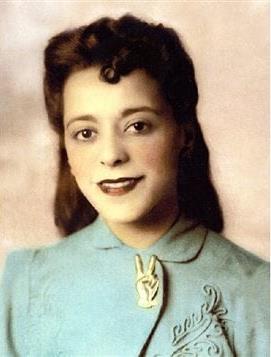Viola Desmond was born in 1914, the daughter of a middle-class mixed-race family in Halifax. When Desmond graduated from high school she worked as a teacher in Black schools, one of very few employment avenues open to her.
Black women in Nova Scotia were restricted from going to beauty salons and studying the art of beauty culture (hairstyling, cosmetics, or wig making), so she attended schools in Montréal and New York.
When she obtained her two diplomas she opened a salon and eventually a beauty school beside her husband Jack Desmond’s barbershop in Halifax.

As an entrepreneur, she achieved financial
independence and became a role model to African-Canadian women through the
success of her enterprises, which included skin and hair care products for
Black women that had previously been unavailable to Nova Scotians.
In November of 1946, Viola was travelling on business from Halifax to Sydney, Nova Scotia, when car trouble obliged her to stop overnight in New Glasgow. She attended a local movie theatre where she encountered segregated seating rules. When told to move to another seat, she refused to comply. She was forcibly removed from the theatre, arrested, held in jail overnight, and then charged, tried, and convicted with tax evasion. That charge, based on the one cent difference in tax between floor and balcony seats, was the only legal infraction that could be invoked to justify placing her in jail.
The physical injury, humiliation, and injustice that Desmond suffered outraged the Nova Scotian Black community. The newly established NSAACP took her case on and engaged a lawyer to contest her conviction. Although they did not succeed in overturning her conviction, the case became a rallying point for Black Nova Scotians seeking to end discrimination in their province. Viola Desmond’s act of defiance has since become iconic for Canadians, representing a turning point in the struggle for rights in Canada.
Having parents and siblings from Nova Scotia and having been both a Hairstylist and Hairstyling teacher I admire Viola's talent and strength in not allowing others to treat her as less than. She had every right to demand equal opportunity in life.

